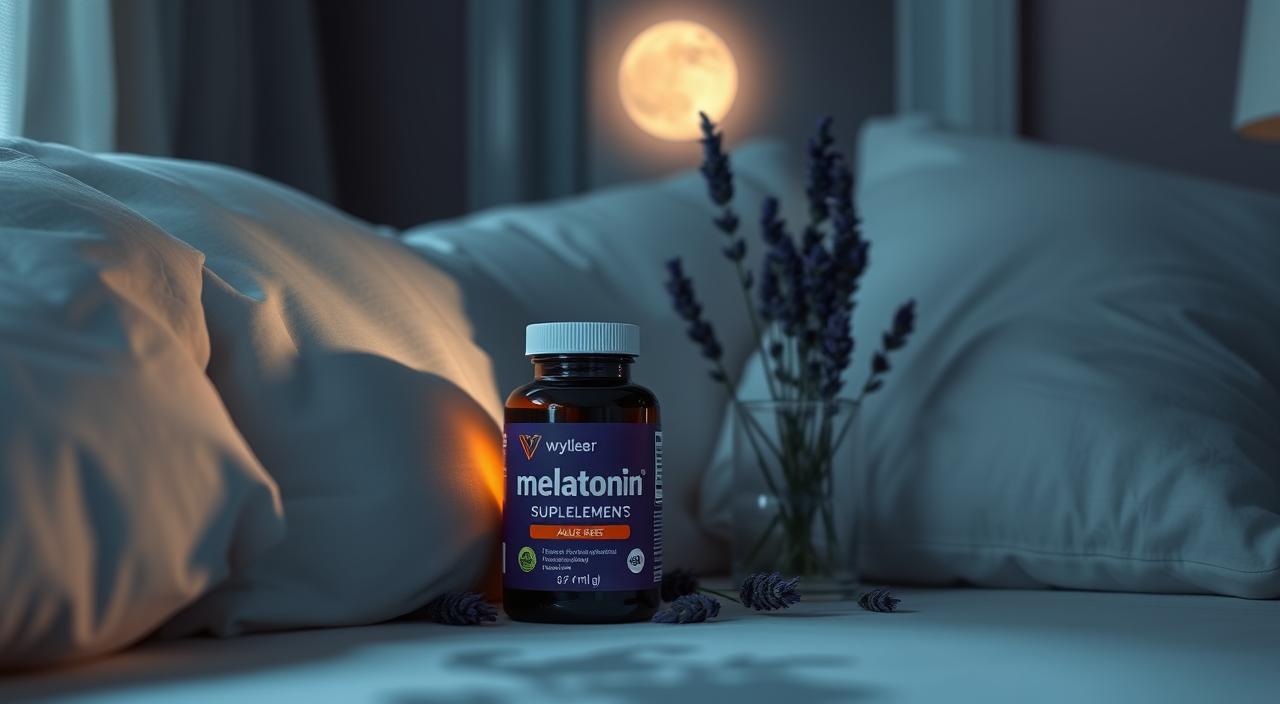Melatonin supplements are getting more popular. They help you fall asleep faster and deal with jet lag or odd work hours, as research shows. Knowing the good and bad about melatonin is key to using them wisely. They can make your sleep better, but it’s important to look at both sides.
More people are using melatonin supplements, which means we need to check how they affect our health. By looking at the good and bad of melatonin, you can decide if it’s right for you. Melatonin helps you sleep faster and adjust to new time zones. But, it’s important to think about any side effects and how it might mix with other medicines.
Key Takeaways
- Melatonin supplements can improve sleep quality and reduce sleep onset time.
- Understanding the Pros and Cons of Melatonin is essential for informed decision-making.
- The benefits of melatonin include improved sleep and adjustment to time zone changes.
- Potential side effects and interactions with other medications must be considered.
- Melatonin health benefits can be significant, but individual results may vary.
- Consulting with a healthcare professional is recommended before taking melatonin supplements.
- Research, such as that found on supplement review websites, can provide valuable insights into the effectiveness and safety of melatonin supplements.
What is Melatonin?
Melatonin is a hormone that helps us sleep and wake up. It’s made by the pineal gland in our brain. The amount of light we get affects how much melatonin we make.
When it’s dark, our pineal gland makes more melatonin. This hormone makes us feel sleepy and calm. Knowing how melatonin works helps us understand its benefits and possible melatonin supplement side effects.
Certain foods like cherries, walnuts, and bananas have melatonin. Some supplements, like l-theanine, also help us relax and boost melatonin. It’s important to use a melatonin dosage guide to avoid side effects and use the supplement safely.
Definition and Role in Sleep Regulation
Melatonin’s role in sleep is complex. Its production can change with age, lifestyle, and light exposure. As we get older, we make less melatonin, which can cause sleep problems and health issues.
Natural Sources of Melatonin
Some foods, like cherries and walnuts, are natural sources of melatonin. Eating these foods can help us relax and increase our melatonin levels. They’re a great part of a healthy diet.
The Science Behind Melatonin Supplements
Melatonin supplements are popular for improving sleep quality. A melatonin for sleep review shows they can help regulate sleep patterns. They work by mimicking the natural melatonin our bodies produce, which helps us feel sleepy.
Research shows melatonin can cut down on how long it takes to fall asleep and increase sleep time. Melatonin research findings indicate it’s great for people with sleep disorders like insomnia. Melatonin affects sleep by controlling our body’s internal clock.
How Melatonin Affects the Body
Melatonin binds to receptors in the brain, helping control our sleep-wake cycle. This can lead to better sleep, more energy, and better overall health. Some studies also suggest it has antioxidant properties, protecting cells from damage.
Research Findings on Sleep Quality
Studies on melatonin’s effect on sleep quality are encouraging. A review of melatonin research findings found it improves sleep in adults and kids. Benefits include quicker sleep onset, longer sleep, and better sleep quality.
Pros of Taking Melatonin Supplements
Melatonin supplements help you fall asleep faster and adjust to new time zones. The benefits of melatonin are many, and studies show it’s good for sleep disorders. It helps your body’s clock, making sleep easier.
Some key benefits of melatonin supplements include:
- Improved sleep quality
- Reduced sleep onset latency
- Increased sleep duration
- Adjustment to time zone changes
When wondering if is melatonin effective for sleep issues, look at the research. It’s good for insomnia, jet lag, and other sleep problems. Plus, it has antioxidant properties, protecting against free radicals.
In summary, melatonin supplements are a great choice for better sleep. They help your body’s clock and adjust to new times. This makes them effective for sleep disorders.
Cons of Melatonin Supplements
It’s important to know the side effects and risks of melatonin supplements. Melatonin supplement side effects can be mild or severe. They may include headaches, dizziness, and nausea.
Some people might get used to melatonin and need more of it. This can lead to more risks. Also, melatonin can mix badly with other medicines, like blood thinners and diabetes drugs. This can cause more harm.
The risks of melatonin supplements are serious. Always talk to a doctor before taking it, if you’re on other meds or have health issues. Knowing the melatonin supplement side effects helps you use it safely and get the most benefits.
- Headaches
- Dizziness
- Nausea
- Daytime drowsiness
- Vivid dreams
- Mood swings
Knowing the risks and side effects of melatonin supplements helps you decide if it’s for you. Always talk to a doctor before starting any new supplement.
Who Should Consider Melatonin?
Understanding who can benefit from melatonin supplements is key. Both adults and children can use melatonin, but the melatonin dosage guide changes with age and sleep disorders. For example, adults with insomnia or those adjusting to new time zones might find it helpful. Children with ADHD or autism may also benefit, but only with a doctor’s guidance.
Before starting melatonin, it’s important to think about melatonin safety concerns. Sleep disorders like restless leg syndrome or sleep apnea might need a different treatment. A healthcare provider can give a personalized melatonin dosage guide to ensure safe use.
- Insomnia
- Sleep apnea
- Restless leg syndrome
- ADHD-related sleep disorders
Always talk to a healthcare provider to find the right treatment for your sleep needs. They can address any melatonin safety concerns you might have.
Dosage Recommendations
It’s important to follow a melatonin dosage guide when taking supplements. This ensures you get the most benefits without side effects. Adults usually take 0.5-5 milligrams, while children should talk to a doctor first.
A melatonin dosage guide helps find the right amount for you. Your age, sleep issues, and health can change what you need. For example, those with insomnia might need more than jet lag sufferers.
Here are some factors that can influence the dosage:
- Age: Older adults may require lower dosages due to decreased melatonin production
- Sleep disorder: Insomnia, sleep apnea, and restless leg syndrome may require different dosages
- Other health conditions: Certain medical conditions, such as diabetes or high blood pressure, may affect melatonin dosage
In conclusion, using a melatonin dosage guide is key for safe and effective use. By considering these factors and taking the right amount, you can enjoy better sleep and health benefits.
| Dosage | Age Group | Sleep Disorder |
|---|---|---|
| 0.5-1 milligram | Children | Jet lag |
| 1-3 milligrams | Adults | Insomnia |
| 3-5 milligrams | Older adults | Sleep apnea |
How to Choose a Melatonin Supplement
Choosing a melatonin supplement requires careful thought. You should look at the different forms like pills, gummies, and liquids. Reading a melatonin for sleep review can guide you. Make sure the product is pure and potent, and check for allergens or interactions.
Key ingredients to seek in a melatonin supplement include:
- Time-release formulas for sustained release
- Natural ingredients, such as valerian root or chamomile
- No artificial additives or preservatives
Be mindful of possible melatonin supplement side effects, like dizziness or nausea. Always talk to a healthcare professional before starting any new supplement.
Centered around the topic of melatonin supplements, it’s vital to consider the following image:
Comparing Melatonin with Other Sleep Aids
When looking at sleep aids, it’s key to know the Pros and Cons of Melatonin compared to others. Comparing sleep medications helps make better choices. Studies show melatonin can help sleep, but it’s not the only choice.
Other sleep aids, like over-the-counter and prescription drugs, have their own ups and downs. Some work faster, while others last longer. Knowing the differences helps pick the right sleep aid for you.
Important things to think about when comparing sleep aids include:
- Efficacy: How well does the sleep aid work?
- Safety: What are the possible side effects and risks?
- Convenience: How easy is it to use the sleep aid?
By looking at these points and melatonin research findings, you can choose the best sleep aid for you. This helps find the right treatment for your sleep needs.
Safety and Regulations of Melatonin Supplements
When thinking about melatonin supplements, it’s key to talk about melatonin safety concerns. The FDA is important in checking the safety and quality of these products. Melatonin is usually safe, but there are possible risks of melatonin like side effects with other medicines or making health problems worse.
For melatonin supplements to be safe and good, makers must follow Good Manufacturing Practices (GMPs). They also need to test regularly for purity and strength. Looking for third-party checks, like NSF International or the National Products Association, can help. These groups make sure the product is up to quality and safety standards. For more on why quality control matters, check out pros and cons of creatine.
When checking if melatonin supplements are safe and good, consider these things:
- How well-known the maker is and if they follow GMPs
- Third-party checks and tests
- If the label is clear about what’s in it and possible side effects
Knowing about the rules and making sure melatonin supplements are quality and safe helps. This way, people can avoid possible risks of melatonin and choose wisely.
Conclusion: Is Melatonin Right for You?
Looking into the pros and cons of melatonin supplements, it’s clear they can help many people sleep better. But, it’s important to be careful and talk to your doctor before starting.
Tips for Safe Use
Start with a small dose of melatonin and only add more if you need to. Watch for any side effects and stop if they’re bad. Most people find melatonin safe, but it’s good to keep an eye on how your body reacts.
Consulting with Healthcare Providers
Talking to your doctor before taking melatonin is key. They can check your sleep issues and health, and help you figure out the right dose. This way, you can use melatonin safely and avoid any problems.



